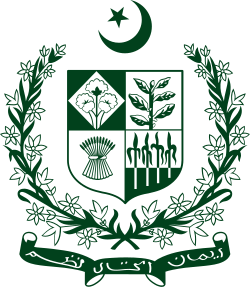The Federal Secretary (also referred to as the Secretary to the Government of Pakistan) is the highest-ranking position in the Government of Pakistan, occupied by the most senior civil servant in a specific ministry or division. The secretary is the administrative head of that ministry or division and oversees and enforces public policy matters. [1] [2] The authority for the creation of this post solely rests with the Cabinet of Pakistan. The position holder is a BPS-22 grade officer, usually belonging to the Pakistan Administrative Service. [3] [4] [5]
Contents
- Powers and responsibilities
- Perception and image
- Federal secretary slots
- Notable federal secretaries
- References

All promotions and appointments to this rank and post are directly made by the prime minister of Pakistan. [6] [7] The post of federal secretary is equivalent to that of chief secretary of a provincial government (within their respective provinces) and to the rank of General in the Pakistan Army, Air Chief Marshal in the Pakistan Air Force, and Admiral in the Pakistan Navy. [8] [9]
Due to the importance of their respective assignments, there are twelve specific federal secretaries which are considered to be the most vital in the Government of Pakistan. These include the establishment secretary (responsible for civil service matters), finance secretary (responsible for the country's treasury), secretary to the prime minister (responsible for Prime Minister's Office), cabinet secretary (responsible for the Cabinet Division), interior secretary (responsible for law and order), commerce secretary (responsible for trade), foreign secretary (responsible for foreign relations), maritime secretary (responsible for ports and shipping), power secretary (responsible for the electricity and power sector), planning and development secretary (responsible for development projects), petroleum secretary (responsible for the petroleum sector), and industry secretary (responsible for industrial development). [10]